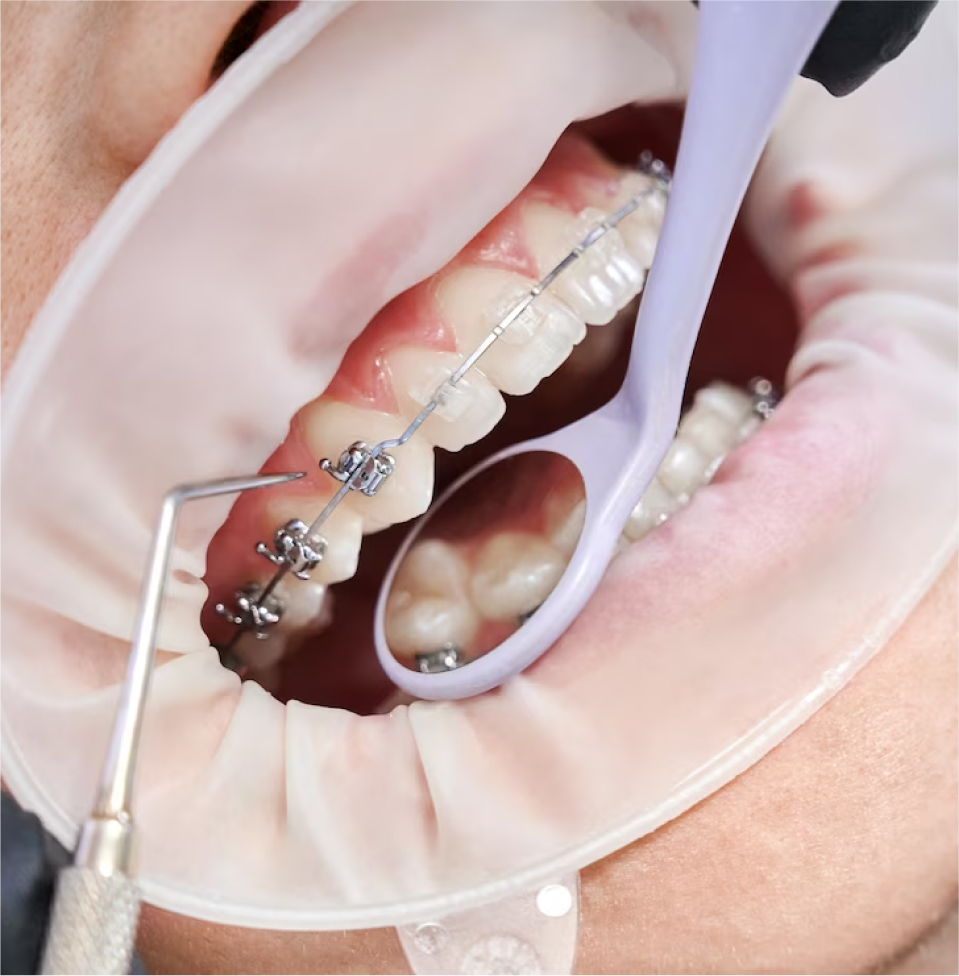Porcelain Crowns
A porcelain crown is a permanent cap or cover that surrounds a natural tooth, improving its appearance and protecting it from further disintegration. We usually recommend one if your tooth is damaged in a way that can’t be resolved with other treatments like fillings. Here is what you need to know about porcelain crowns:

When is a Porcelain Crown Used?
Porcelain crowns completely cover a tooth that has suffered damage from disease or injury. There are several common situations where you may need one:
A Cracked or Chipped Tooth
Sometimes small chips or cracks can be repaired through other options like dental bonding or tooth contouring. However, more significant damage may put the tooth at risk for abscesses or more extensive chipping or cracking. In these cases, we may recommend a porcelain crown to protect the tooth. This crown can be adjusted to fit well with your other teeth.


A Tooth That is Worn Down
Some teeth take more wear and tear than others, especially back teeth that do most of the chewing. In some cases, untreated issues with the patient’s bite can cause most of the chewing to occur on only a few teeth. In other circumstances, one tooth may have had several large fillings, and there isn’t much tooth left. If any of these issues apply to your tooth, you may benefit from having a porcelain crown installed to protect the tooth from any more wear.
Supporting a Dental Bridge
A Very Misshapen or Discolored Tooth
Covering a Dental Implant
For certain patients, a bridge may not work well to fill a hole where a tooth was removed. Sometimes bridges can move, slip, or make noise in the mouth, and in rare cases, they might even cause bone damage. For these reasons, some patients may have a dental implant instead. First, we remove the diseased or damaged tooth, then we place a titanium rod into the jawbone, where it fuses with natural bone. If there is not enough natural bone, we might perform a bone graft. After the titanium has successfully adhered to the jawbone, we’ll attach an abutment, a small piece onto which we will later adhere the crown.Then your gums are allowed to heal for a few weeks, and when they’re better, the crown is cemented to the abutment.

After a Root Canal Treatment
A root canal is performed when decay or damage to the tooth has invaded the inner pulp, causing a painful abscess. This is most commonly caused by untreated cavities but can also happen due to a crack or chip in the tooth (hence why we recommend a crown for many cracked or chipped teeth). The dentist will clean out the pulp and shape the root canal/canals, clearing away any diseased tissue and blood vessels. As a result, the tooth no longer has a blood supply and is not serviced by the immune system, so it becomes brittle, weak, and vulnerable to further infections. To prevent these potential problems, we place a porcelain crown over the treated tooth.
For Cosmetic Modifications
Porcelain crowns are sometimes used to remedy various cosmetic issues that can’t be fixed with other treatments like whitening or contouring.
Uses for Children
In some cases, we do place a crown on a baby tooth that is still needed but too decayed to handle a filling. In other circumstances, we may use crowns to protect baby teeth from decay if the child is at high risk of cavities and/or has difficulty with some aspect of an oral health routine (such as major challenges with brushing due to sensory issues, etc.).
What Kind of Crown – Porcelain or Ceramic – Should You Get?
People often ask about porcelain and ceramic crowns, but there are several other kinds:
- Stainless steel crowns are frequently used on children, as they are fairly durable and will only be needed until the baby tooth falls out (and the crown goes with it). Other types of metal crowns are available, but these are rarely used on adults because they don’t match the other teeth in your mouth.
- All-resin crowns are less expensive, but they don’t hold up as well, so we don’t usually recommend these.
- Porcelain-fused-to-metal. This type of crown combines the strength of metal with the more natural look of porcelain in a shade that matches your other teeth. The porcelain overlays the metal, so in some cases, the metal part may show through as a dark line. However, these crowns are a good choice for back teeth, as they are sometimes visible, but most people don’t get a close enough look to notice a faint line.
- All porcelain crowns. These have an excellent, natural look that blends in with the other teeth and provide a safe alternative for people with metal allergies. However, they are slightly less strong than porcelain-fused-to-metal varieties and can cause some wear on the opposing teeth.
- Ceramic crowns. Pressed ceramic crowns use a hard inner layer of ceramic instead of metal, giving the crown more strength. On top is a cap of porcelain, which allows the best color-matching with other teeth, while providing stronger support than the all-porcelain type.
At your first appointment, we will recommend the type of crown we believe will work best for your particular situation. If you have questions or concerns, please let us know, and we’ll be happy to answer them.
Will Dental Insurance Pay for a Crown with Porcelain?
Most dental insurance policies cover at least some of the cost of major restorative work like a porcelain crown. How much is covered will depend on the policy. Some cover only 50 percent, while others may pay 70 or 80 percent, so you can expect a copay. Dental policies also usually have a cap on how much they pay per year, which varies but may be as little as $1,000. In some instances where you have had other restorative work done already, there may not be enough left on the policy to cover your crown. The best way to find out what your copay will be is to talk with our administrative staff, who can request a predetermination from the insurance company. This will lay out exactly how much they plan to pay and what your expected contribution will be.


Contact a Gwinnett County Dental Office About Porcelain Crowns Today
If you need a crown or have other concerns about your teeth, please contact Great Care Family Dentistry today and set up an appointment for a consultation. We’ll examine your teeth, diagnose the issue, and let you know if a porcelain crown or another treatment will be the best option.
